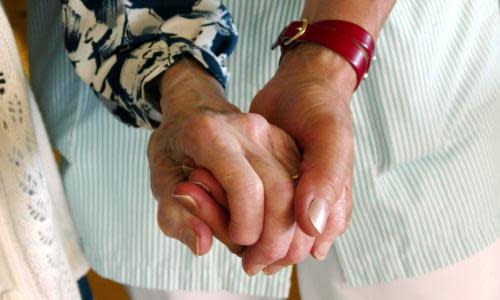My mum was in a good nursing home. It still failed her, and that's the problem Australia faces

When my mum died after 16 long years in a Sydney nursing home, one of the carers was with her and tearfully described how mum had sighed and taken her last breath. We had been at her bedside for days but, as is often the way, missed being there at the end. It was a comfort to hear from someone who genuinely cared.
The authentic concern shown by the young Nepali woman was the other side of what had been at times a distressing lack of care. My mum was relatively young – 67 – when she was diagnosed with frontal lobe dementia and admitted to a high-care nursing home. She was 84 when she died, so there were many years in between.
After she moved in to what was a state-of-the-art new development, where she had her own room with an ensuite overlooking the garden, she indicated to me one day that her mouth was sore and when the staff said they didn’t know what was wrong, I had a look in her mouth myself.
Related: From funding to a right to care: the aged care royal commission's key recommendations
She had a full denture on the top and a removable partial-denture on the bottom. While the top denture was taken out and cleaned at night, the carers had not noticed that she had a plate on the bottom and had never removed it for cleaning.
Her gums had grown over the wires and her entire bottom jaw was inflamed and infected. She didn’t have the ability to tell anyone what was wrong or even to understand herself why her mouth was sore. She was in considerable pain. This is how vulnerable someone with dementia is.
I couldn’t believe that this had happened to my mother in what was I thought a well run care home. It had all the services people look for in aged care but it didn’t have enough workers with the training to truly care for someone or the procedures to make sure this oversight didn’t happen. And it’s not just this facility. Mum was in three different homes and this was the best.
The call by the royal commissioners for all staff in aged care to have a minimum level of training in line with the childcare sector must be implemented as a matter of urgency. The royal commission has also highlighted standards of oral care, nutritional needs and the needs of people living with dementia as areas of need.
I had to take my mum to the dental hospital where they could sedate her and remove the appliance and stitch up her wounds. I was so enraged I later called the CEO of the organisation who ran the home directly. He was apologetic but the levels of care never changed.
Unless relatives and friends are extremely vigilant, pushy and put a lot of time into visits, a loved one’s care can fall through the cracks. Footcare, skincare, diet and personal daily care are all neglected on a regular basis. Most of the residents in my mum’s house had no visitors at all, no one to advocate for them except the staff. It was heartbreaking.
Related: I quit my aged care job when I could no longer give residents the life they deserve | Anonymous
Sometimes when we arrived on the weekend, there would be not a single carer in sight, as residents wandered around on their own or sat watching television. The overworked carers might be putting a resident in bed or changing someone who had soiled themselves and there was no one to keep an eye on the lounge area. There wasn’t a spare hand to deal with distressed, crying or fighting residents, and we would have to jump in.
If you wanted to talk to a registered nurse, you would have to wait for her to find time in her busy round as she was responsible for dispensing medication to the entire home and was stretched very thin.
About 10 years before mum died the nurse manager told me she was was not eating and would “last a few days or a week at most”. She was refusing to eat, the manager said, and there was nothing they could do.
I took the week off work and brought her high protein smoothies and soups and fed her myself. After four days she had the brightness back in her eyes and she stabilised. If I hadn’t stepped in, she may have died from malnutrition.
There were many wonderful, caring workers I got to know over the years and none of these incidents were their fault. Most of them were migrants, working for low wages with little training and even less support. Two of the carers even turned up to farewell mum at her funeral. It’s the system that has to change.

 Yahoo Finance
Yahoo Finance 